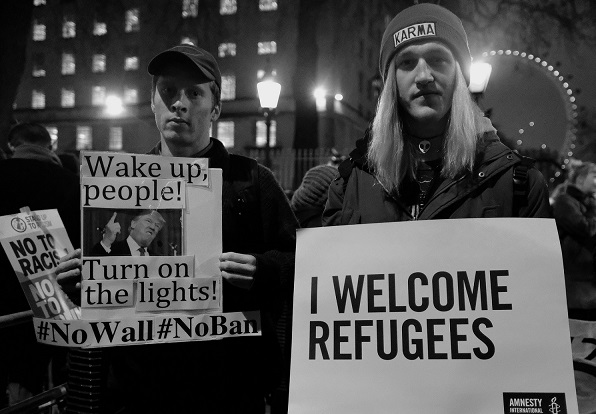On Monday, President Trump signed a new executive order barring refugees from six majority-Muslim nations that have strong ties to terrorism. This executive order differs from the last one by removing Iraq from the ban and eliminating the preferential option for the area’s persecuted Christian minority. Regardless of whether one sees this as a violation of Christian charity or a prudentially wise decision to stem potential sources of terror, one fact remains: The entire debate over Middle Eastern refugees has centered around what the government should be doing. Lost is the role of individual philanthropy, church and charitable initiatives, and ways to serve the majority of displaced persons who do not wish to leave their homes.
Fr. Peter Farrington, a Coptic priest who has a deep familiarity with the region, writes about “The missing element in the Middle Eastern refugee debate: private philanthropy” in his newest essay for Religion & Liberty Transatlantic. Fr. Farrington notes both that private charity produces better results for less money and that the U.S. dollar stretches further in the Mideast than in the West:
For any given amount of state aid – or private charity – much more could be done for many more refugees in the Middle East, than could be achieved by spending the same sums on relocating a relatively small number of migrants. A report produced by War Child, a charity that serves child refugees in the Middle East, calculates that it costs 10 times more to support a refugee in the West than in the region (approximately $3,000 a year, compared to $30,000 to resettle refugees in Germany or other European nations).
Another report from November 2015 concluded that a relocated Syrian migrant requires an average funding of $64,370 for the first five years of relocation to the USA, while the UNHCR estimates that funding of $5,285 is required to support a refugee in the region over the same five-year period. The UNHCR is currently seeking to plug a $2.5 billion funding gap in its efforts to provide for four million Syrian refugees in the Middle East. This is what it would cost to relocate approximately 39,000 Syrians, and cover their costs in the United States. Save the Children, one of the largest charities working in the region, is able to provide a shelter kit, including tent and sleeping bags, to provide warm temporary accommodation for a refugee family for only $120. It is reasonable to compare the outcome for one refugee relocated to the USA, and supported for five years, with the possibility of providing shelter for more than 500 refugee families in the Middle East. (Emphasis added.)
Stephen Herreid has noted that the Catholic hierarchy in the Mideast actively opposes a policy of mass Christian emigration to the West, which they believe will leave the remaining Christian population – by definition, those with the least resources – more vulnerable to jihadist attempts at liquidation. Fr. Farrington takes up this aspect, as well:
The Melkite Catholic Archbishop of Aleppo, Jean-Clément Jeanbart, addressed a well-meaning Canadian audience, saying, “We’re not happy when we see the Canadian government moving refugees and facilitating their integration. It hurts us. A lot.” What he did request was greater levels of aid to the churches caring for the displaced in the Middle East. The Maronite Syrian bishop, Elias Sleman, considering the situation of his community, says, “We are strong in our faith, rooted in our history. We have been here for 2,000 years. We refuse to go!” He asks for Western support that would allow those who might otherwise become migrants to stay in the region and be able to support themselves. Even those who support giving Christians priority in immigration, such as Archbishop Bashar Warda of Erbil in Iraq, continue to ask for support for the services their own Christian communities are providing refugees, saying, “My archdiocese hosts the largest community of displaced Christians in my country, and since 2014, we have received no money from the United States government and no money from the UN.”
The significant benefits that citizens of the West could render to refugees of all religious backgrounds independent of government action has not penetrated public consciousness on this issue. “Meanwhile, in the UK, levels of individual charitable giving are declining,” Fr. Farrington writes.
The reasons many in the West refer all vexing problems first to the government for resolution are many faceted. But Fr. Farrington’s conclusion dovetails with a new study released by Bowdoin psychology professor Zachary Rothschild and University of Southern Mississippi psychology professor Lucas A. Keefer explaining that moral outrage is self-serving. Those who believe they are morally culpable for causing suffering to another person feel better if that guilt is transferred, scapegoat-like, to another person or entity. The desire to do something is as psychologically valuable as actually doing anything of use. Fr. Farrington explains how we can be found not merely hearers, but doers of the Word, in his latest essay.
You can read Fr. Farrington’s complete essay here.
(Photo credit: Alisdare Hickson. This photo has been cropped. CC BY-SA 2.0.)
